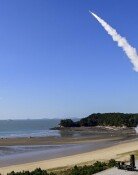[Column] A Journey into mind of N.K leadership
[Column] A Journey into mind of N.K leadership
Posted July. 13, 2000 08:50,
A month has gone by since the landmark inter-Korean summit. It is now time to shake off the initial disbelief and excitement, to come to our senses, and reflect on the implications and the future of our peninsula made possible by the historic meeting. It would be foolish to think such task of predicting the future of inter-Korean relationship an easy one. However, it is a necessary one as we look toward the various possibilities facing us and as we prepare ourselves psychologically and politically for the turn of events.
To do so, we must first examine the motives and visions of leaders of both sides. As for the South, we desire a greater atmosphere of trust as current hostility is diffused between the two states. With peace and security guaranteed, we hope for a greater interactive cooperation which could become the foundation of a tangible unification.
What could be running through the minds of the North Korean leadership? So far, many have focused their attention on the question of why Kim Jung-Il had agreed to the Summit and why he has shown such hospitality to President Kim Dae-Jung and his entourage of negotiators. However, the focus must be turned to the question of the direction the North Korean leader would take concerning the inter-Korean relationship and his vision for his state. By placing ourselves in the shoes of Kim Jong-Il, we may perhaps consider certain goals which must be running through his mind.
The first must be the elevation of economic activity and prosperity through economic aid from the South and the international community. The second must be the question of national security while keeping intact the current system of governance. Finally, the third must be the retention of sovereign recognition and statehood on the equal footing with the South. For the actualization of such goals, the North will undoubtedly try to maneuver the inter-Korean relationship toward one leading to economic benefit. As such, reunion of separated families and other interchanges are political necessities which will pave the way for building a greater avenue of cooperation.
In the case of economic reformation, which model would they pursue? The most obvious one would be the Chinese model. However, such adoption would not be without pitfalls. From the very point of departure in the economic reformation, China was in a greater advantageous situation than the North is today. First off, China did not face a threat to the system of government with the opening of its doors. Also, having a vast population, China itself offered a vast market which made foreign capital investments easy to obtain. At the same time, the great number of Chinese emigrants throughout the world offered their collective economic resource for assistance. As for the North, they must implement limited structural reformation as they look toward the South for economic cooperation and development.
In the case of national defense and the armed forces, a comprehensive revision in their policy can not be hoped for. The difficulty not only lies in the internal political dynamic which include the military leadership, but also as the development of missiles and other weapons of mass destruction are the bargaining chips which the North uses at the negotiations with the super-powers.
In the foreign affairs front, the North has been expanding its list of states with whom they have amicable diplomatic relationship, and they have applied for a membership to the ARF. However, there is little possibility of the North entering into 4-party or other multi-principle negotiations for the talks concerning the future of the peninsula. It is likely they would recognize the greater benefit to be had through bi-lateral talks with Korea as well as the United States and Japan.
On the basis of the analysis made so far, three possibilities lie before us. First is an ideal scenario which all of us hope for. It is a scenario of termination of hostility between the two states and the entrance into a new era of peace and understanding. Then, through greater economic and political cooperation and interchange, all people of both North and South live improved lives.
The second possibility is for one side to renege on the agreements for whatever the reason and the peninsula is thrown back to the one of hostility and distrust. This should be avoided at all costs as it would bring immense disappointment and despair for us all.
The third possibility, although it is unlikely, is for the South to meet an obstacle economically or politically or even in the area of national defense. Firstly, with the sense of urgency and danger posed by the North on the decline, there may be a loosening of the national defense policy including gradual withdrawal of the US Armed Forces. Second, there is always the danger of the deterioration of the South`s economic health due to the aid for the North much beyond the ability of the South to maintain. Lastly, a political instability may erupt in either the South or the North as the fluid situation in the inter-Korean relationship brings about power struggles within the governance system set off by such issues as Constitutional revisions and the question of successor, among others.
It goes without saying that all efforts need to be diverted toward the realization of the first scenario. However, we must always remember that the second and the third scenarios are not impossibilities and as such, necessary precautions must be in place should either one come knocking at our door.







